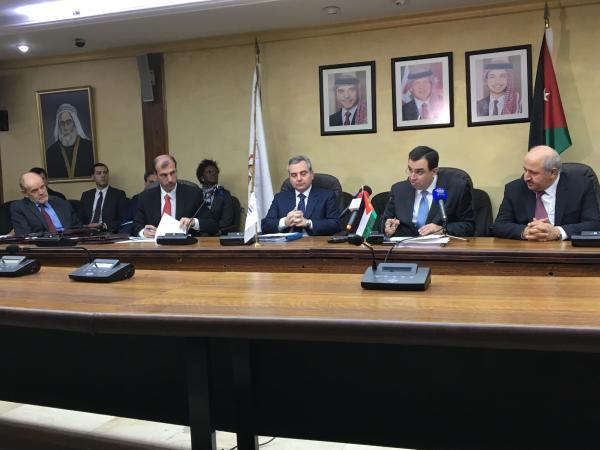
The European Investment Bank (EIB) signed today two loan agreements worth USD 126 million for financing two projects in the water and energy sectors in Jordan to support sustainable economic and social development in the country.
At a ceremony hosted by the Ministry of Planning and International Cooperation in Amman, the two agreements were signed by H.E. Imad Najib Fakhoury, Minister of Planning and International Cooperation, H.E. Hazim Al-Nasser, Minister of Water and Irrigation, H.E Tawfig Habashneh, Chairman of the Board of the Yarmouk Water Company, H.E. Engineer Abdel Fattah Daradkeh, Managing Director of the National Electric Power Company (NEPCO), Mr Andrea Fontana, Head of the EU Delegation to Jordan and Mr Dario Scannapieco, Vice-President of the EIB.
The first project, Wadi Al-Arab Water System II, will support a high priority water supply infrastructure investment. The project will improve drinking water availability for the growing population in the Northern Governorates, which has been significantly increased by the large number of Syrian refugees in the area. The project is in line with Jordan’s National Water Strategy and the EIB’s External Lending Mandate. The project is co-financed by the EIB (lead financial institution), Agence Française de Développement and the EU Neighbourhood Investment Facility (NIF). The EIB’s loan of USD 54 million (JOD 38 million) for the project will help to treat and convey 30 million m3/year of fresh water from the King Abdullah Canal (KAC) in the Northern Jordan valley to the Zabda Reservoir which serves the Northern Governorate of Irbid, the second largest of Jordan’s 12 Governorates in terms of population and located 80 km north of Amman. The loan will be used to build (i) a raw water intake from the KAC, (ii) a new water treatment plant, (iii) pumping stations, and (iv) a 25.6 km transmission pipeline to convey the treated water from the water treatment plant to the Zabda Reservoir. The project is scheduled to be implemented over the period 2015-2018.
In addition, the EIB is providing a loan of USD 72 million (JOD 51 million) to NEPCO. The EIB’s loan will finance the NEPCO Green Corridor project, which is an essential part of Jordan’s renewable energy development programme. The project will strengthen the country’s high-voltage electricity transmission backbone, enabling new facilities generating large amounts of renewable energy to be connected to the network, and electricity to be transmitted from the central/southern desert areas to Amman, where generation is fossil-fuel based. The project will thus contribute to reducing carbon dioxide emissions. The project is in line with the EIB’s External Lending Mandate and the EU’s Single Support Framework Programme for Jordan, under which Jordan and the EU identified the increase in energy-generating capacity using renewable energy resources as a priority for EU action in Jordan. The project is co-financed by the EIB (lead lender), Agence Française de Développement and the EU Neighbourhood Investment Facility. The EIB’s loan for the project will be used to (i) construct a new electricity substation in New Ma’an located north of the city of Ma’an, (ii) build new transmission lines, and (iii) modify existing substations to accommodate these new lines. The project is scheduled to be implemented over the period 2015-2018.
“Reinforcing economic and social infrastructure is the basis for achieving economic development and boosting prosperity, and I am very pleased that the EIB can support Jordan’s efforts to achieve this goal,” said EIB Vice-President Mr Dario Scannapieco, “So far, Jordan has achieved impressive results in improving the quality of infrastructure in the energy and water sectors and these gains need be sustained.”
At the signing ceremony, the EIB Vice-President stated, “Our aim is to help Jordan improve its socio-economic infrastructure. By securing the supply of energy, the NEPCO Green Corridor project will contribute to economic development and poverty reduction through continuous access to essential power supplies in Jordan. The project is highly complementary to ongoing investments in renewable energy, as the ability to bring renewable energy to market depends on adequate transmission infrastructure. The EIB and the EU Delegation are therefore supporting Jordan’s national objective to reach a 10% renewable energy share in the country’s energy mix by 2020. The Wadi Al-Arab Water System II project will secure reliable and improved access to drinking water which is also beneficial for health, the commercial sector and thus for economic development and social stability in Jordan. The EIB is therefore supporting the Government’s efforts to bridge the drinking water availability gap in a water-stressed country.”
Press contacts
Khaled Elnimr, +352 4379 70482, k.elnimr@eib.org

Photographer: EIB ©To be defined
Download original

Photographer: EIB ©To be defined
Download original

Photographer: EIB ©To be defined
Download original

Photographer: EIB ©To be defined
Download original

Photographer: EIB ©To be defined
Download original

Photographer: EIB ©To be defined
Download original

Photographer: EIB ©To be defined
Download original